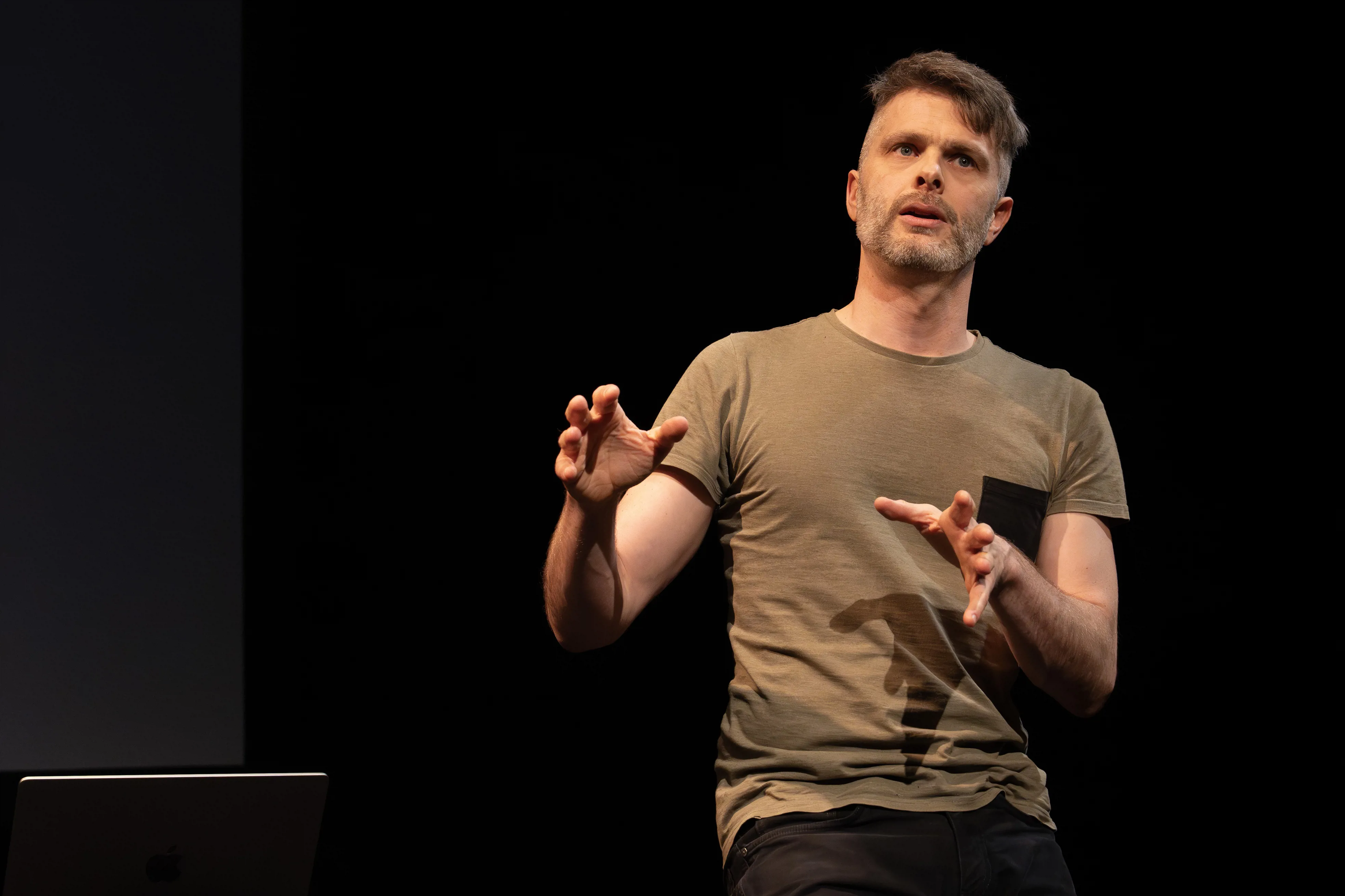A Conversation with David Finnigan: Exploring Climate Change and Human Resilience through Theater in DEEP HISTORY.

BY ELISEO VALERIO
“We've been here before," says David Finnigan, writer and performer of DEEP HISTORY. "Climate shocks, planetary transformations, huge ecosystem changes—they're not new to any human being. Our ancestors lived through many shocks like this, and we can learn from that." In his one-man play that intertwines 75,000 years of human history with the urgent reality of today's climate crisis, Finnigan establishes the importance of learning from the lessons of our shared human past. At the same time, he makes it clear that DEEP HISTORY is not meant to be purely an educational piece about climate change. "It's not about teaching people anymore—it's about gathering together and saying, 'We're all experiencing this. Here's how I'm going through it; how are you going through it?’" In our conversation, Finnigan shared insights into his creation process, his belief in theater's power to create empathy, and why he avoids offering solutions in favor of honest reflection and conversation.
Initially, Finnigan hadn't intended DEEP HISTORY to be so focused on the present. In fact, he originally set out to create a piece about the past, about humanity's long history of weathering through climate crises. “But the present has a way of intruding," he said, referring specifically to the devastating Australian bushfires of 2019 that forced the narrative of his play to shift unexpectedly: "I set out to write one play, and over the course of three days, it turned into something completely different.” He added, “The last few days of 2019 intruded on my process in a big way, warped and twisted what I was doing, and took it somewhere I had never intended it to go.” The human stories at the heart of DEEP HISTORY that date back thousands of years urge audiences across continents and time zones to view climate crises as shared global experiences. By putting the past and present in dialogue, Finnigan makes it clear that we cannot ignore or avoid the effects of climate change—no matter where we live.
After performing DEEP HISTORY in London and Edinburgh, Finnigan expects his New York audience to understand the danger of wildfires, perhaps more so than its British counterpart: “Interestingly, doing it in the U.K., I do feel like there is a degree of people who are like, ‘Wow, that’s terrifying, that’s shocking,’ because the U.K. is perhaps protected from some of the extremes of climate impact. But doing it in New York, I think you guys know what it means to breathe smoke for three months at a time, and this isn’t new.”
For Finnigan, one of the most powerful aspects of theater is its ability to create empathy. “Theater can create empathy in ways that science can’t,” he says. After years of trying to bridge the gap between climate science and public awareness, Finnigan realized that his role wasn’t to educate people on climate change, but to tell the honest truth. “I’ve let go of the expectation that I can inspire action or change minds,” Finnigan explains. “Now, I focus on creating space for reflection.”
Finnigan’s inclusion of Aboriginal Australian stories furthers the exploration of empathy in the play. “To be a culture that survives for tens of thousands of years, you have to be in conversation with the land, not in conflict with it,” he explains. These oral histories, rooted in Australian geography, offer a powerful reminder that climate change is not just a contemporary issue—it’s part of a long human narrative of adapting to a changing environment to ensure our survival. On this side of the world, Mesoamerican Indigenous communities exemplify what being in conversation with the land looks like in practice through their sustainable agricultural methods such as milpa farming. This ancient system, which involves growing maize, beans, and squash together, not only promotes food security but also helps the soil regenerate, allowing these communities to adapt to environmental changes and crises over generations. Like the Aboriginal stories in DEEP HISTORY, these Indigenous practices show how closely human survival depends on maintaining a symbiotic relationship with the natural world.
Unlike other works of climate-focused art, DEEP HISTORY does not end with a message, moral, or mention of a solution. “There is no message,” Finnigan says plainly. “What an audience needs is honesty. It’s not about offering solutions, but about creating a space where we can all gather together and face the reality of what’s happening.” With a runtime of a little over an hour, the show allows audiences to keep the conversation going after the performance. In fact, Finnigan encourages this dialogue: “I hope people find the stories engaging and leave with questions. No one has the answers, but collectively we can share our experience.”
DEEP HISTORY doesn’t just encourage me to reflect and question, it inspires me to create. Finnigan’s weaving together of history, science, and personal experience invites me into a collective space in which I can build on the stories of our shared human past to grapple with our present (and future) world. Finnigan’s creative process offers a roadmap for this kind of storytelling. As he puts it, “Go deep, go weird, go to the very edge of human understanding. Then bring back what you learned, what you took, what you understood, how that changed you—that is my kind of recipe.”
Ultimately, DEEP HISTORY is about the power of stories that connect people across time and space. “The reason I'm excited to get up and tell this story is, first of all, those tales from the deep past—deep history—I find them fascinating, and they have changed my understanding of what it is to be a human on this planet.” By linking stories from the distant past to our immediate present, Finnigan reminds us of our ancestral resilience in a theatrical space, one in which we can reflect on our own place in this moment of deep global change.
DEEP HISTORY began performances on Saturday, October 5 and runs through Sunday, November 10. Click here for more information on the show and how to get tickets.
This piece was developed with the BIPOC Critics Lab, a new program founded by Jose Solís training the next generation of BIPOC journalists. Follow on X: @BIPOCCriticsLab

Eliseo Valerio is a Mexican American, D.C.-based educator and culture critic. As a Teaching Artist, he’s worked with Shakespeare Theatre Company, Ford’s Theatre, Second Stage, The New Victory Theater, the Alley Theatre, and in Mexico on a Fulbright grant. He cares deeply about promoting language and culture through the arts.